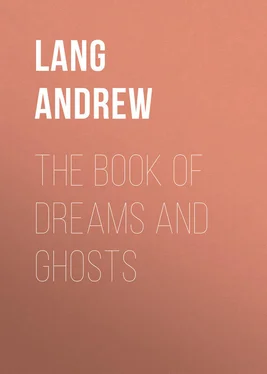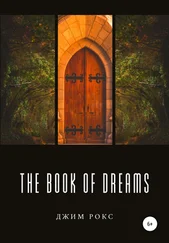Andrew Lang - The Book of Dreams and Ghosts
Здесь есть возможность читать онлайн «Andrew Lang - The Book of Dreams and Ghosts» — ознакомительный отрывок электронной книги совершенно бесплатно, а после прочтения отрывка купить полную версию. В некоторых случаях можно слушать аудио, скачать через торрент в формате fb2 и присутствует краткое содержание. Жанр: foreign_antique, foreign_prose, на английском языке. Описание произведения, (предисловие) а так же отзывы посетителей доступны на портале библиотеки ЛибКат.
- Название:The Book of Dreams and Ghosts
- Автор:
- Жанр:
- Год:неизвестен
- ISBN:нет данных
- Рейтинг книги:4 / 5. Голосов: 1
-
Избранное:Добавить в избранное
- Отзывы:
-
Ваша оценка:
- 80
- 1
- 2
- 3
- 4
- 5
The Book of Dreams and Ghosts: краткое содержание, описание и аннотация
Предлагаем к чтению аннотацию, описание, краткое содержание или предисловие (зависит от того, что написал сам автор книги «The Book of Dreams and Ghosts»). Если вы не нашли необходимую информацию о книге — напишите в комментариях, мы постараемся отыскать её.
The Book of Dreams and Ghosts — читать онлайн ознакомительный отрывок
Ниже представлен текст книги, разбитый по страницам. Система сохранения места последней прочитанной страницы, позволяет с удобством читать онлайн бесплатно книгу «The Book of Dreams and Ghosts», без необходимости каждый раз заново искать на чём Вы остановились. Поставьте закладку, и сможете в любой момент перейти на страницу, на которой закончили чтение.
Интервал:
Закладка:
Of Hone’s affair there are two versions. Both may be given, as they are short. If they illustrate the déjà vu , they also illustrate the fond discrepancies of all such narratives. 15 15 From Some Account of the Conversion of the late William Hone , supplied by some friend of W. H. to compiler. Name not given.
THE KNOT IN THE SHUTTER
“It is said that a dream produced a powerful effect on Hone’s mind. He dreamt that he was introduced into a room where he was an entire stranger, and saw himself seated at a table, and on going towards the window his attention was somehow or other attracted to the window-shutter, and particularly to a knot in the wood, which was of singular appearance; and on waking the whole scene, and especially the knot in the shutter, left a most vivid impression on his mind. Some time afterwards, on going, I think, into the country, he was at some house shown into a chamber where he had never been before, and which instantly struck him as being the identical chamber of his dream. He turned directly to the window, where the same knot in the shutter caught his eye. This incident, to his investigating spirit, induced a train of reflection which overthrew his cherished theories of materialism, and resulted in conviction that there were spiritual agencies as susceptible of proof as any facts of physical science; and this appears to have been one of the links in that mysterious chain of events by which, according to the inscrutable purposes of the Divine will, man is sometimes compelled to bow to an unseen and divine power, and ultimately to believe and live.”
“Another of the Christian friends from whom, in his later years, William Hone received so much kindness, has also furnished recollections of him.
“.. Two or three anecdotes which he related are all I can contribute towards a piece of mental history which, if preserved, would have been highly interesting. The first in point of time as to his taste of mind, was a circumstance which shook his confidence in materialism , though it did not lead to his conversion. It was one of those mental phenomena which he saw to be inexplicable by the doctrines he then held.
“It was as follows: He was called in the course of business into a part of London quite new to him, and as he walked along the street he noticed to himself that he had never been there; but on being shown into a room in a house where he had to wait some time, he immediately fancied that it was all familiar, that he had seen it before, ‘and if so,’ said he to himself, ‘there is a very peculiar knot in this shutter’. He opened the shutter and found the knot. ‘Now then,’ thought he, ‘here is something I cannot explain on my principles!’”
Indeed the occurrence is not very explicable on any principles, as a detail not visible without search was sought and verified, and that by a habitual mocker at anything out of the common way. For example, Hone published a comic explanation, correct or not, of the famous Stockwell mystery.
Supposing Hone’s story to be true, it naturally conducts us to yet more unfamiliar, and therefore less credible dreams, in which the unknown past, present, or future is correctly revealed.
CHAPTER II
Veracious Dreams. Past , Present and Future unknown Events “ revealed”. Theory of “ Mental Telegraphy ” or “ Telepathy ” fails to meet Dreams of the unknowable Future. Dreams of unrecorded Past , how alone they can be corroborated. Queen Mary’s Jewels. Story from Brierre de Boismont. Mr. Williams’s Dream before Mr. Perceval’s Murder. Discrepancies of Evidence. Curious Story of Bude Kirk. Mr. Williams’s Version. Dream of a Rattlesnake. Discrepancies. Dream of the Red Lamp . “ Illusions Hypnagogiques .” The Scar in the Moustache. Dream of the Future. The Coral Sprigs. Anglo-Saxon Indifference. A Celtic Dream. The Satin Slippers. Waking Dreams. The Dead Shopman. Dreams in Swoons.
Perhaps nothing, not even a ghost, is so staggering to the powers of belief as a well-authenticated dream which strikes the bull’s eye of facts not known to the dreamer nor capable of being guessed by him. If the events beheld in the dream are far away in space, or are remote in time past, the puzzle is difficult enough. But if the events are still in the future, perhaps no kind of explanation except a mere “fluke” can even be suggested. Say that I dream of an event occurring at a distance, and that I record or act on my dream before it is corroborated. Suppose, too, that the event is not one which could be guessed, like the death of an invalid or the result of a race or of an election. This would be odd enough, but the facts of which I dreamed must have been present in the minds of living people. Now, if there is such a thing as “mental telegraphy” or “telepathy,” 16 16 What is now called “mental telegraphy” or “telepathy” is quite an old idea. Bacon calls it “sympathy” between two distant minds, sympathy so strong that one communicates with the other without using the recognised channels of the senses. Izaak Walton explains in the same way Dr. Donne’s vision, in Paris, of his wife and dead child. “If two lutes are strung to an exact harmony, and one is struck, the other sounds,” argues Walton. Two minds may be as harmoniously attuned and communicate each with each. Of course, in the case of the lutes there are actual vibrations, physical facts. But we know nothing of vibrations in the brain which can traverse space to another brain. Many experiments have been made in consciously transferring thoughts or emotions from one mind to another. These are very liable to be vitiated by bad observation, collusion and other causes. Meanwhile, intercommunication between mind and mind without the aid of the recognised senses – a supposed process of “telepathy” – is a current explanation of the dreams in which knowledge is obtained that exists in the mind of another person, and of the delusion by virtue of which one person sees another who is perhaps dying, or in some other crisis, at a distance. The idea is popular. A poor Highland woman wrote to her son in Glasgow: “Don’t be thinking too much of us, or I shall be seeing you some evening in the byre”. This is a simple expression of the hypothesis of “telepathy” or “mental telegraphy”.
my mind, in dream, may have “tapped” the minds of the people who knew the facts. We may not believe in “mental telegraphy,” but we can imagine it as one of the unknown possibilities of nature. Again, if I dream of an unchronicled event in the past, and if a letter of some historical person is later discovered which confirms the accuracy of my dream, we can at least conceive (though we need not believe) that the intelligence was telegraphed to my dreaming mind from the mind of a dead actor in, or witness of the historical scene, for the facts are unknown to living man. But even these wild guesses cannot cover a dream which correctly reveals events of the future; events necessarily not known to any finite mind of the living or of the dead, and too full of detail for an explanation by aid of chance coincidence.
In face of these difficulties mankind has gone on believing in dreams of all three classes: dreams revealing the unknown present, the unknown past, and the unknown future. The judicious reasonably set them all aside as the results of fortuitous coincidence, or revived recollection, or of the illusions of a false memory, or of imposture, conscious or unconscious. However, the stories continue to be told, and our business is with the stories.
Taking, first, dreams of the unknown past, we find a large modern collection of these attributed to a lady named “Miss A-”. They were waking dreams representing obscure incidents of the past, and were later corroborated by records in books, newspapers and manuscripts. But as these books and papers existed, and were known to exist, before the occurrence of the visions, it is obvious that the matter of the visions may have been derived from the books and so forth, or at least, a sceptic will vastly prefer this explanation. What we need is a dream or vision of the unknown past, corroborated by a document not known to exist at the time when the vision took place and was recorded. Probably there is no such instance, but the following tale, picturesque in itself, has a kind of shadow of the only satisfactory sort of corroboration.
Читать дальшеИнтервал:
Закладка:
Похожие книги на «The Book of Dreams and Ghosts»
Представляем Вашему вниманию похожие книги на «The Book of Dreams and Ghosts» списком для выбора. Мы отобрали схожую по названию и смыслу литературу в надежде предоставить читателям больше вариантов отыскать новые, интересные, ещё непрочитанные произведения.
Обсуждение, отзывы о книге «The Book of Dreams and Ghosts» и просто собственные мнения читателей. Оставьте ваши комментарии, напишите, что Вы думаете о произведении, его смысле или главных героях. Укажите что конкретно понравилось, а что нет, и почему Вы так считаете.












